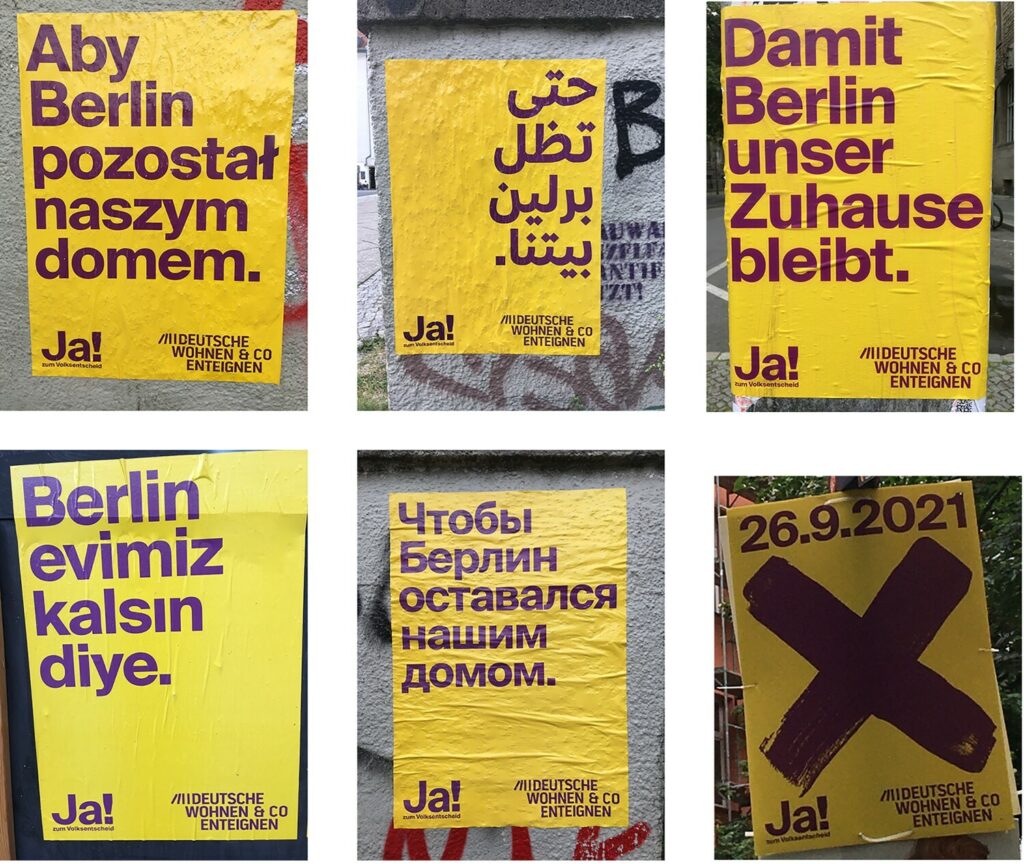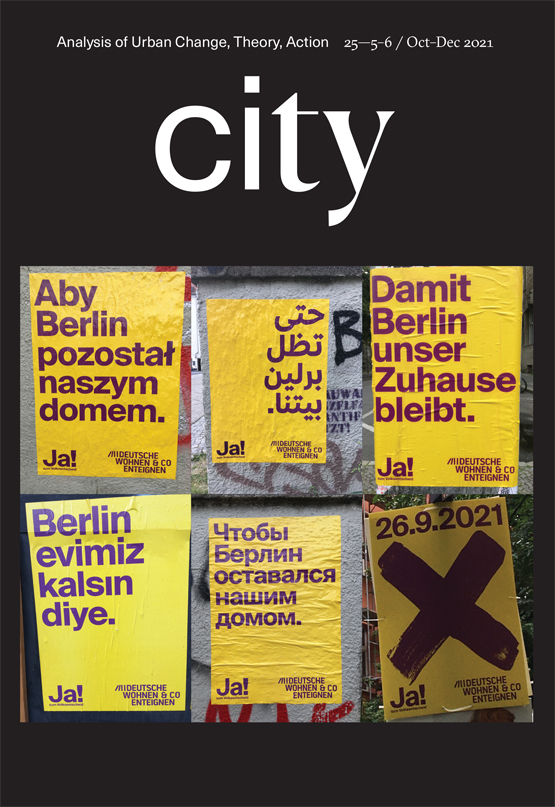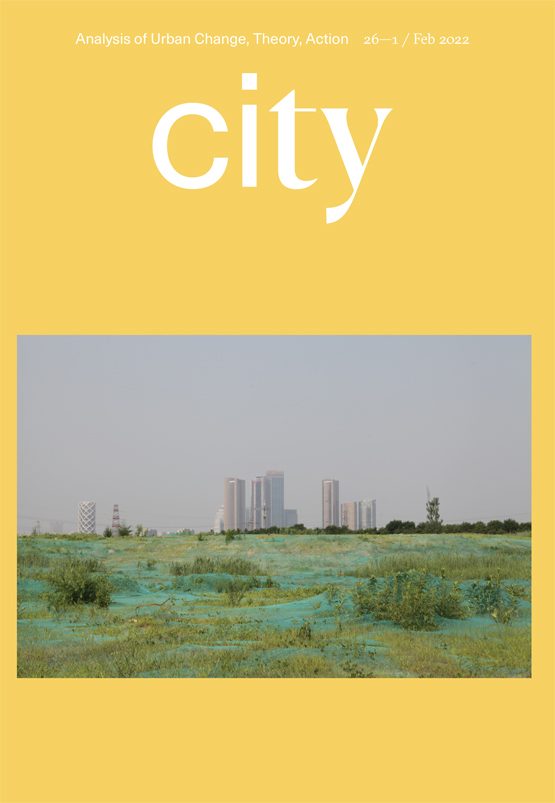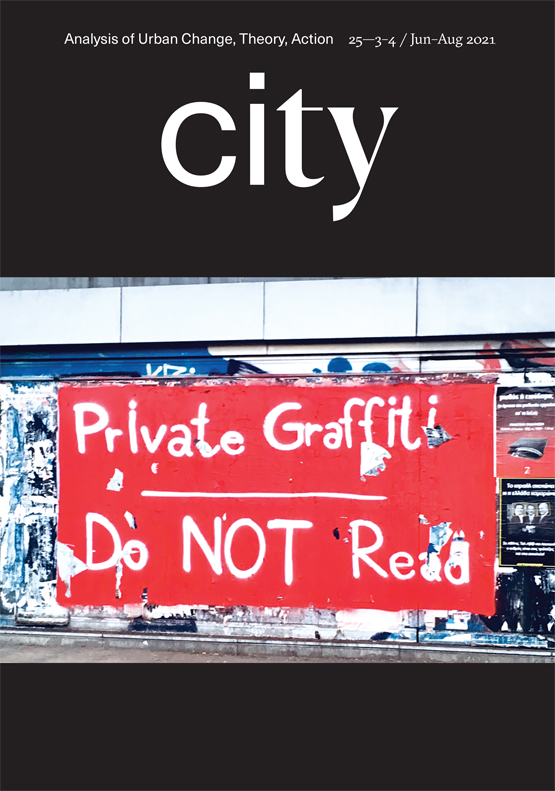founding editor: bob caterrall
editor: city editors
editorial: Ja! Damit Berlin unser Zuhause bleibt! That Berlin will remain our home! حتى تظل برلين بيتنا Berlin evimiz kalsın diye! чтобы берлин оставался нашим домом Aby Berlin pozostał naszym domem!, by anna richter and debbie humphry
Berliners won a major victory and precedent for housing justice on 26 September 2021. There was a clear majority of 57.6% in the referendum initiated by the campaign group Deutsche Wohnen & Co Enteignen (Expropriate Deutsche Wohnen & Co) (2021). Together with the national and local elections, voters in Berlin were asked whether they supported the drafting of a bill to expropriate and socialise housing stock owned by corporate landlords with more than 3000 properties, such as Deutsche Wohnen or Akelius. In 2020, Leilani Farha, the UN’s Special Rapporteur for the Right to Housing, had already accused corporate landlord Akelius of creating a hostile environment for its tenants ‘through severe deterioration of housing conditions, higher rents and increased risk of threat of eviction’ (UNHRC 29 April 2020; see also Gertten 2019). Akelius also explicitly support the deliberate displacement of lower-income households from the city, with Roger Akelius advising Berlin to build a sister city outside the existing perimeter for people with lower incomes as increases in inner city housing prices will be unaffordable for the majority (Tagesspiegel 15 April 2021; see also dwenteignen.de 2021). The demand for expropriation rests on the German constitution’s article 15, which states: ‘Land […] may be transferred to common ownership […] for the purpose of socialisation’. The housing stock in question in the referendum is approximately 240,000 flats, the size of a large city in its own right, so the demanded bill presents a meaningful alternative vision for a more equitable and inclusive kind of housing provision in Berlin. In this editorial, our corresponding editor Anna Richter recounts the morning after the election, and reflects with Debbie Humphry on its implications (see Figure 1).

The morning following the referendum I cycled past a group of people dancing in front of a bakery, complete with a boom-box and champagne. After the long Covid-induced halt to groups and meetings, partying well into the morning was an unusual sight on an otherwise everyday morning in Berlin Neukölln. The partygoers with yellow-purple high viz vests were a handful of the many, many supporters and campaigners of the Deutsche Wohnen & Co. Enteignen campaign (see Figures 2–6). The revellers were celebrating their victory, our victory, against the excessive profits made by corporate landlords at the cost of a poor deal for tenants and pricing so many low and middle-income Berliners out of their city. We knew we had a victory for the transfer of private property into public social use, a reverse of the insistent trends of the past decades driven by the relentless individualist market economy of neoliberalism. We knew it was an important step towards equality. Yet the simultaneously held local elections resulted in a small victory for the Social Democrats who had already announced that they would not implement the referendum. Beyond the dancing, then, we would need to face this ambiguity.

Cycling that morning through Kreuzkölln, Neukölln’s and Kreuzberg’s borderland, there were other small groups still celebrating the victory. Banners hung from many windows and there were campaign stickers on every traffic light. No thought had yet been given to the difficulty of forming a new national government after sixteen years of Angela Merkel, or how the contradictory results in Berlin might impact the non-binding yet still irrevocable demand for the expropriation of corporate landlords and the socialisation of housing. Locally the victory was felt, present and palpable in the streets: there was no doubt that the referendum had been won decisively, in some wards at over 80%. It felt like anything was possible. A feeling that came from a victory shared, won through the dogged work of so many campaigners, their ceaseless presence on the streets over the past months and their many initiatives, messages and symbols that adorned the streets and paved the way for the resounding ‘Yes’ to the Referendum.
to read this editorial in full, please click here.





